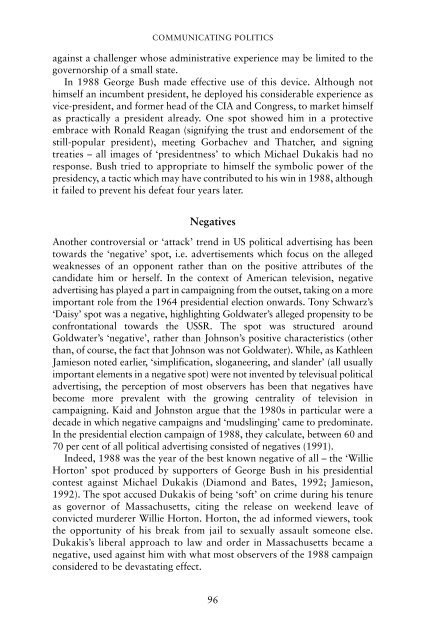20130412164339753295_book_an-introduction-to-political-communication
20130412164339753295_book_an-introduction-to-political-communication
20130412164339753295_book_an-introduction-to-political-communication
Create successful ePaper yourself
Turn your PDF publications into a flip-book with our unique Google optimized e-Paper software.
COMMUNICATING POLITICS<br />
against a challenger whose administrative experience may be limited <strong>to</strong> the<br />
governorship of a small state.<br />
In 1988 George Bush made effective use of this device. Although not<br />
himself <strong>an</strong> incumbent president, he deployed his considerable experience as<br />
vice-president, <strong>an</strong>d former head of the CIA <strong>an</strong>d Congress, <strong>to</strong> market himself<br />
as practically a president already. One spot showed him in a protective<br />
embrace with Ronald Reag<strong>an</strong> (signifying the trust <strong>an</strong>d endorsement of the<br />
still-popular president), meeting Gorbachev <strong>an</strong>d Thatcher, <strong>an</strong>d signing<br />
treaties – all images of ‘presidentness’ <strong>to</strong> which Michael Dukakis had no<br />
response. Bush tried <strong>to</strong> appropriate <strong>to</strong> himself the symbolic power of the<br />
presidency, a tactic which may have contributed <strong>to</strong> his win in 1988, although<br />
it failed <strong>to</strong> prevent his defeat four years later.<br />
Negatives<br />
Another controversial or ‘attack’ trend in US <strong>political</strong> advertising has been<br />
<strong>to</strong>wards the ‘negative’ spot, i.e. advertisements which focus on the alleged<br />
weaknesses of <strong>an</strong> opponent rather th<strong>an</strong> on the positive attributes of the<br />
c<strong>an</strong>didate him or herself. In the context of Americ<strong>an</strong> television, negative<br />
advertising has played a part in campaigning from the outset, taking on a more<br />
import<strong>an</strong>t role from the 1964 presidential election onwards. Tony Schwarz’s<br />
‘Daisy’ spot was a negative, highlighting Goldwater’s alleged propensity <strong>to</strong> be<br />
confrontational <strong>to</strong>wards the USSR. The spot was structured around<br />
Goldwater’s ‘negative’, rather th<strong>an</strong> Johnson’s positive characteristics (other<br />
th<strong>an</strong>, of course, the fact that Johnson was not Goldwater). While, as Kathleen<br />
Jamieson noted earlier, ‘simplification, slog<strong>an</strong>eering, <strong>an</strong>d sl<strong>an</strong>der’ (all usually<br />
import<strong>an</strong>t elements in a negative spot) were not invented by televisual <strong>political</strong><br />
advertising, the perception of most observers has been that negatives have<br />
become more prevalent with the growing centrality of television in<br />
campaigning. Kaid <strong>an</strong>d Johns<strong>to</strong>n argue that the 1980s in particular were a<br />
decade in which negative campaigns <strong>an</strong>d ‘mudslinging’ came <strong>to</strong> predominate.<br />
In the presidential election campaign of 1988, they calculate, between 60 <strong>an</strong>d<br />
70 per cent of all <strong>political</strong> advertising consisted of negatives (1991).<br />
Indeed, 1988 was the year of the best known negative of all – the ‘Willie<br />
Hor<strong>to</strong>n’ spot produced by supporters of George Bush in his presidential<br />
contest against Michael Dukakis (Diamond <strong>an</strong>d Bates, 1992; Jamieson,<br />
1992). The spot accused Dukakis of being ‘soft’ on crime during his tenure<br />
as governor of Massachusetts, citing the release on weekend leave of<br />
convicted murderer Willie Hor<strong>to</strong>n. Hor<strong>to</strong>n, the ad informed viewers, <strong>to</strong>ok<br />
the opportunity of his break from jail <strong>to</strong> sexually assault someone else.<br />
Dukakis’s liberal approach <strong>to</strong> law <strong>an</strong>d order in Massachusetts became a<br />
negative, used against him with what most observers of the 1988 campaign<br />
considered <strong>to</strong> be devastating effect.<br />
96
















